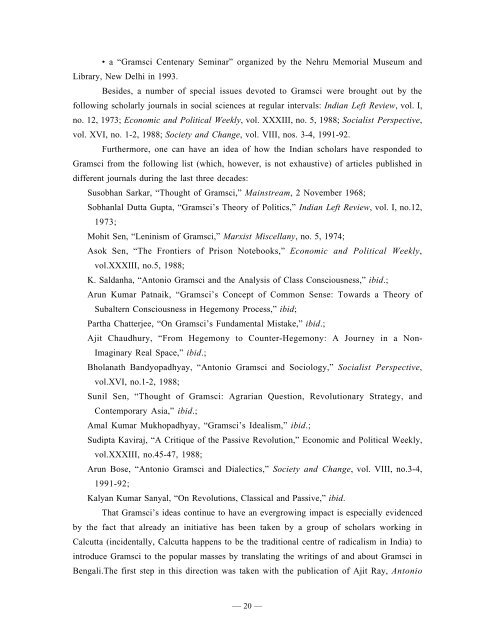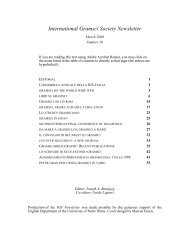Newsletter - International Gramsci Society
Newsletter - International Gramsci Society
Newsletter - International Gramsci Society
You also want an ePaper? Increase the reach of your titles
YUMPU automatically turns print PDFs into web optimized ePapers that Google loves.
• a “<strong>Gramsci</strong> Centenary Seminar” organized by the Nehru Memorial Museum and<br />
Library, New Delhi in 1993.<br />
Besides, a number of special issues devoted to <strong>Gramsci</strong> were brought out by the<br />
following scholarly journals in social sciences at regular intervals: Indian Left Review, vol. I,<br />
no. 12, 1973; Economic and Political Weekly, vol. XXXIII, no. 5, 1988; Socialist Perspective,<br />
vol. XVI, no. 1-2, 1988; <strong>Society</strong> and Change, vol. VIII, nos. 3-4, 1991-92.<br />
Furthermore, one can have an idea of how the Indian scholars have responded to<br />
<strong>Gramsci</strong> from the following list (which, however, is not exhaustive) of articles published in<br />
different journals during the last three decades:<br />
Susobhan Sarkar, “Thought of <strong>Gramsci</strong>,” Mainstream, 2 November 1968;<br />
Sobhanlal Dutta Gupta, “<strong>Gramsci</strong>’s Theory of Politics,” Indian Left Review, vol. I, no.12,<br />
1973;<br />
Mohit Sen, “Leninism of <strong>Gramsci</strong>,” Marxist Miscellany, no. 5, 1974;<br />
Asok Sen, “The Frontiers of Prison Notebooks,” Economic and Political Weekly,<br />
vol.XXXIII, no.5, 1988;<br />
K. Saldanha, “Antonio <strong>Gramsci</strong> and the Analysis of Class Consciousness,” ibid.;<br />
Arun Kumar Patnaik, “<strong>Gramsci</strong>’s Concept of Common Sense: Towards a Theory of<br />
Subaltern Consciousness in Hegemony Process,” ibid;<br />
Partha Chatterjee, “On <strong>Gramsci</strong>’s Fundamental Mistake,” ibid.;<br />
Ajit Chaudhury, “From Hegemony to Counter-Hegemony: A Journey in a Non-<br />
Imaginary Real Space,” ibid.;<br />
Bholanath Bandyopadhyay, “Antonio <strong>Gramsci</strong> and Sociology,” Socialist Perspective,<br />
vol.XVI, no.1-2, 1988;<br />
Sunil Sen, “Thought of <strong>Gramsci</strong>: Agrarian Question, Revolutionary Strategy, and<br />
Contemporary Asia,” ibid.;<br />
Amal Kumar Mukhopadhyay, “<strong>Gramsci</strong>’s Idealism,” ibid.;<br />
Sudipta Kaviraj, “A Critique of the Passive Revolution,” Economic and Political Weekly,<br />
vol.XXXIII, no.45-47, 1988;<br />
Arun Bose, “Antonio <strong>Gramsci</strong> and Dialectics,” <strong>Society</strong> and Change, vol. VIII, no.3-4,<br />
1991-92;<br />
Kalyan Kumar Sanyal, “On Revolutions, Classical and Passive,” ibid.<br />
That <strong>Gramsci</strong>’s ideas continue to have an evergrowing impact is especially evidenced<br />
by the fact that already an initiative has been taken by a group of scholars working in<br />
Calcutta (incidentally, Calcutta happens to be the traditional centre of radicalism in India) to<br />
introduce <strong>Gramsci</strong> to the popular masses by translating the writings of and about <strong>Gramsci</strong> in<br />
Bengali.The first step in this direction was taken with the publication of Ajit Ray, Antonio<br />
— 20 —



